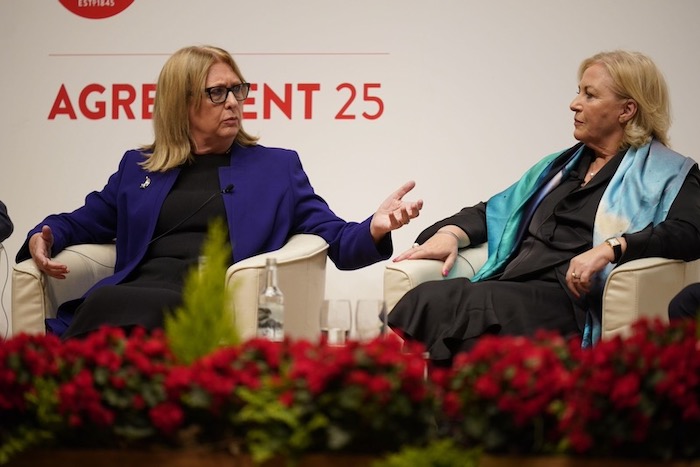
The Church’s teaching in relation to homosexuality is a source for anti-gay laws in places such as Uganda, Professor Mary McAleese has said.
Speaking about human rights and the Church, she said the Church “practises, embeds and teaches things which promote hatred, contempt, exclusion, bigotry, bias, discrimination, victim-shaming, cover-up”.
The former president of Ireland is one of the keynote speakers at the October lay-led synodal assembly organised by the international reform network, Spirit Unbounded. The assembly, on the theme of human rights in the Catholic Church, will take place in Rome, Bristol and online 8-14 October and is open to everyone.
Another speaker who will address the assembly, Marianne Duddy-Burke, director of DignityUSA, called on Pope Francis and the Vatican to be more vocal and speak out against Uganda’s anti-gay laws.
She told The Tablet that members of the LGBTQI+ community in Uganda are living in fear for their lives. She referred to Pope Francis’ comment last January when he said, “Being homosexual isn’t a crime” and criticised laws that criminalise homosexuality as “unjust”, Duddy-Burke said the Pope must follow this up “with clear directives to bishops and catholics about our moral duty to honour the dignity and human rights of LGBTIQ+ people. The lives of many are at stake, in Africa and elsewhere.”
She said that through her work as co-chair of the Global Network of Rainbow Catholics and DignityUSA she was “hearing horrific stories of intensified targeting” since the law increasing penalties for being gay came into effect in Uganda.
“There are so many places in Africa, where the situation for LGBTQI people has become dire,” she said.
Mary McAleese said Pope Francis has said a number of “vaguely useful things” on the issue such as his “Who am I to judge” remark. “That was interesting and useful except he does judge and his Church judges and regrettably the CDF document on same-sex blessings which [Francis] signed off on, used this terrible expression that gay married catholics could not or receive God’s grace.”
She added, “Francis tries to have it both ways in relation to anti-gay legislation. It was useful that he did ask his fellow bishops, particularly the African countries, not to support legislation which outlawed homosexuality but rather to decriminalise. But with the greatest respect to Pope Francis that is the kind of thing we were saying 40 and 50 years ago. It is at the very least four decades behind the curve of where the people of God are at in relation to homosexuality.
“For me the most pressing issue is what does the magisterium do internally; how does it change the teaching for example in relation to gay people within the Church; how does it change Church teaching and practice in relation to the inclusion or exclusion of women. The truth is, in terms of those issues, he [Francis] has done pretty much nothing that is credible.”
The issue of where human rights fit internally in the Church is “crucial” she said because “it sets the agenda for how we meet and what we meet as. Do we meet as equals? Is the synod going to be a discipleship of equals? And the answer seems to be no, the magisterium is still in control. The magisterium will still set the agenda, it will decide what can be discussed and it will decide what the outcomes will be.”
Whistleblower and former priest, Brian Devlin, who is one of the organisers of the Spirit Unbounded assembly, told The Tablet, “There is a real problem with human rights in the Catholic Church that needs to be addressed. We are an assembly of Christian people who are trying to make the Church a better place, a kinder place and a safer place for each of us to live in and to embrace.”
Complete Article ↪HERE↩!
